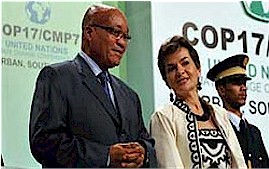
Republic of South Africa President Jacob Zuma with Cuban representative at the Durban Climate Change Conference held in late November and early December 2011. The US and other imperialist states continue to pollute and destroy the planet., a photo by Pan-African News Wire File Photos on Flickr.
6 December 2011
Last updated at 10:37 ET
UN climate talks 'ambition' call
By Richard Black
Environment correspondent, BBC News,
South African President Jacob Zuma has called on governments to be more ambitious as they search for agreement at the UN climate talks.
The Earth is in danger, he said - but deciding what to do about it was a more difficult issue.
UN Secretary-General Ban Ki-moon also asked for more ambition, saying that the financial crisis should be a spur.
Twelve heads of state and about 130 ministers have until Friday to decide what outcome they want from the talks.
Earlier in the day, their delegations heard analysts confirm that the Earth's surface is on course to warm by about 3.5C (6.3F) by 2100, rather than the 2C (3.6F) that governments have agreed as the maximum.
Opening the ministerial segment, Mr Zuma described the UN talks, in the coastal city of Durban, as "a decisive moment".
He appealed for all governments to respect the tradition of multilateralism, describing climate change as "a global problem that requires a global solution".
Decisions here need to reflect current and future concerns, he said.
"We are all agreed that the Earth is in danger, and we're all agreed that we must do something about it," he told delegates.
"But the problem is when we've got to say what it is, and how."
Mr Ban said that movement towards a green economy was crucial in order to overcome not only climate change, but the coming shortages of natural resources.
"The answer is clear, even if the exact path is not," he said.
Indian anger
Behind the scenes, ministers and their teams began to step up diplomatic activity in a series of multilateral and bilateral meetings.
Many delegates are particularly keen to discover how far and how fast China is prepared to go towards a future legally-binding agreement to drive emissions down.
It is widely believed that China holds the key to whether the talks end with a breakthrough or a breakdown.
Many developing countries are also angered by the hard line being taken by the Indian delegation, which is holding to the line that only the traditional "developed" countries should have to engage in binding restrictions, despite the fact that some countries in the "developing world" bloc now have higher per-capita emissions and incomes.
Some African nations and small island states are keen to tell the Indian government that it risks isolating itself from the rest of the developing world bloc here.
There is also generalised frustration with the US. Despite President Obama's pledge three years ago to "lead the world" on climate change, many sources indicate that behind the scenes, his officials are blocking whatever measures they can.
Rising tide
Concern of countries that feel vulnerable to climate impacts has been fuelled by several recent analyses showing that current pledges made by governments are very unlikely to keep the rise in global average temperature since pre-industrial times below 2C.
Institute for Climate Impact Research, and Ecofys, was released on the sidelines of the UN talks.
Their top-line conclusion is that warming of about 3.5C is likely by 2100.
That could be brought down by tougher caps on emissions after the current pledges' end-date of 2020; but that would be far more expensive, they calculate.
"To put it bluntly, the longer we wait, the less options we will have, the more it will cost, the less likely we are to be able to stay below global warming of 2C, and the bigger the threat to the world's most vulnerable," said Bill Hare, director of Climate Analytics.
Other recent reports from the United Nations Environment Programme (Unep) and the International Energy Agency (EIA) reached similar conclusions.
"The door to achieving our objectives is rapidly closing," said IEA executive director Maria van der Hoeven.
"While I strongly urge an agreement on emissions, I have a simple message for the participants in these talks: don't wait for a global deal - act now."
The longer governments wait, the more they risk locking themselves into a high-carbon energy system that is insecure and inefficient, the agency said.
Ms van der Hoeven's words were echoed by a plethora of campaign groups around the conference venue.
While they are keen to see agreement on a package of measures here, some are concerned that an overwhelming desire for a deal could make the final document very weak.
They maintain that it should be based on the science coming from groups such as Unep, Climate Analytics and the IEA.
"Ministers here in Durban have no excuse if they ignore the deafening alarm bells coming from the scientific community," said Keith Allott, head of climate change at WWF-UK.
"Durban can and must agree a second Kyoto Protocol commitment period, and a mandate to strike a comprehensive legal agreement in 2015.
"But we also need strong action to increase ambition right now - being legally bound to a world of 4C warming is simply unacceptable."
No comments:
Post a Comment